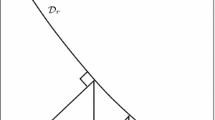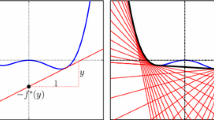Abstract
Structured low-rank approximation problems are very popular in the scientific community since they are involved in several applications in different scientific fields. The search for new algorithms which improve the performance of the existing ones is still an active research topic. However, almost all the existing results focus on the class of linearly structured matrices. Motivated by two applications in the field of computer algebra and system identification, respectively, we propose an algorithm for structured low-rank approximation of nonlinearly structured matrices. The idea comes from an extension of the same method studied and tested by the author in the linear case.





Similar content being viewed by others
Notes
The algorithm is not expected to find a common factor if two roots of the same polynomial are very close.
References
Eckart, C., Young, G.: The approximation of one matrix by another one of lower rank. Psychometrika 1, 211–218 (1936). https://doi.org/10.1007/BF02288367
Markovsky, I.: Low-rank Approximation: Algorithms, Implementation, Applications, 2nd edn. Springer, Berlin (2019)
Chu, M.T., Funderlic, R.E., Plemmons, L.J.: Structured low rank approximation. Linear Algebra Its Appl. 366, 157–172 (2003). https://doi.org/10.1016/S0024-3795(02)00505-0
De Moor, B.: Total least squares for affinely structured matrices and the noisy realization problem. IEEE Trans. Signal Process. 42, 3104–3113 (1994). https://doi.org/10.1109/78.330370
Usevich, K., Markovsky, I.: Variable projection for affinely structured low-rank approximation in weighted 2-norms. J. Comput. Appl. Math. 272, 430–448 (2014). https://doi.org/10.1016/j.cam.2013.04.034
Shklyar, S., Kukush, A., Markovsky, I., Van Huffel, S.: On the conic section fitting problem. J. Multivar. Anal. 98, 588–624 (2007). https://doi.org/10.1016/j.jmva.2005.12.003
Markovsky, I., Kukush, A., Van Huffel, S.: Consistent least squares fitting of ellipsoids. Numer. Math. 98, 177–194 (2004). https://doi.org/10.1007/s00211-004-0526-9
Markovsky, I., Usevich, K.: Nonlinearly structured low-rank approximation. In: Fu, Y.R. (ed.) Low-Rank and Sparse Modeling for Visual Analysis, pp 1–22. Springer (2014). https://doi.org/10.1007/978-3-319-12000-3_1
Usevich, K., Markovsky, I.: Adjusted least squares fitting of algebraic hypersurfaces. Linear Algebra Appl. 502, 243–274 (2014). https://doi.org/10.1016/j.laa.2015.07.023
Rosen, J.B., Park, H., Glick, J.: Structured total least norm for nonlinear problems. SIAM J. Matrix Anal. Appl. 20(1), 14–30 (1998). https://doi.org/10.1137/S0895479896301662
Lemmerling, P., Van Huffel, S., De Moor, B.: The structured total least-squares approach for non-linearly structured matrices. Numer. Linear Algebra Appl. 9, 321–332 (2002). https://doi.org/10.1002/nla.276
Fazzi, A., Kukush, A., Markovsky, I.: Bias correction for Vandermonde low-rank approximation. Econ. Stat. In press. https://doi.org/10.1016/j.ecosta.2021.09.001 (2021)
Fazzi, A., Guglielmi, N., Markovsky, I.: An ODE based method for computing the approximate greatest common divisor of polynomials. Numer. Algorithms 81, 719–740 (2019). https://doi.org/10.1007/s11075-018-0569-0
Guglielmi, N., Markovsky, I.: An ODE based method for computing the distance of coprime polynomials to common divisibility. SIAM J. Numer. Anal. 55, 1456–1482 (2017). https://doi.org/10.1137/15M1018265
Fazzi, A., Guglielmi, N., Markovsky, I.: Generalized algorithms for the approximate matrix polynomial GCD of reducing data uncertainties with application to MIMO system and control. J. Comput. Appl. Math. 393. https://doi.org/10.1016/j.cam.2021.113499 (2021)
Fazzi, A., Guglielmi, N., Markovsky, I.: A gradient system approach for Hankel structured low-rank approximation. Linear Algebra its appl. 623, 236–257 (2021). https://doi.org/10.1016/j.laa.2020.11.016
Barkhuijsen, H., De Beer, R., Van Ormondt, D.: Improved algorithm for noniterative time-domain model fitting to exponentially damped magnetic resonance signals. J. Magentic Resonance 73, 553–557 (1987). https://doi.org/10.1016/0022-2364(87)90023-0
Markovsky, I., Fazzi, A., Guglielmi, N.: Applications of polynomial common factor computation in signal processing. In: et al, Y.D. (ed.) Latent Variable Analysis and Signal Separation. Lecture Notes in Computer Science, vol. 10891, pp 99–106. Springer (2018. https://doi.org/10.1007/978-3-319-93764-9_10)
Fazzi, A., Guglielmi, N., Markovsky, I.: Computing common factors of matrix polynomials with applications in system and control theory. In: Proc. of the IEEE Conf. on Decision and Control, Nice, France, pp. 7721–7726. https://doi.org/10.1109/CDC40024.2019.9030137 (2019)
De Iuliis, V., Germani, A., Manes, C.: Identification of forward and feedback transfer functions in closed-loop systems with feedback delay. IFAC-PapersOnLine 50(1), 12847–12852 (2017). https://doi.org/10.1016/j.ifacol.2017.08.1935
Markovsky, I., Van Huffel, S.: An algorithm for approximate common divisor computation. In: Proceedings of MTNS’06, Kyoto, Japan, pp. 274–279 (2006)
Pan, V.Y.: Computation of approximate polynomial GCDs and an extension. Inf. Comput. 167, 71–85 (2001). https://doi.org/10.1006/inco.2001.3032
Qiu, W., Hua, Y., Abed-Meraim, K.: A subspace method for the computation of the GCD of polynomials. Automatica 33, 741–743 (1997). https://doi.org/10.1016/S0005-1098(96)00244-0
Terui, A.: GPGCD: An iterative method for calculating approximate GCD of univariate polynomials. Theoret. Comput. Sci. 479, 127–149 (2013). https://doi.org/10.1007/978-3-642-15274-0_22
Usevich, K., Markovsky, I.: Variable projection methods for approximate (greatest) common divisor computations. Theor. Comput. Sci. 681, 176–198 (2017). https://doi.org/10.1016/j.tcs.2017.03.028
Zeng, Z., Dayton, B.H.: The approximate GCD of inexact polynomials, Part I: a univariate algorithm. In: Proceedings of the 2004 International Symposium on Symbolic and Algebraic Computation, pp 320–327. ACM (2004), https://doi.org/10.1145/1005285.1005331
Markovsky, I., Willems, J.C., Van Huffel, S., De Moor, B.: Exact and approximate modeling of linear systems: a behavioral approach. SIAM (2006)
Berberich, J., Allgöwer, F.: A trajectory-based framework for data-driven system analysis and control. In: Eur. Control Conf, pp 1365–1370 (2020), https://doi.org/10.23919/ECC51009.2020.9143608
Rueda-Escobedo, J.G., Schiffer, J.: Data-driven internal model control of second-order discrete volterra systems. In: IEEE Conf. Decision Control, pp 4572–4579 (2020), https://doi.org/10.1109/CDC42340.2020.9304122
Mishra, V., Markovsky, I., Fazzi, A., Dreesen, P.: Data-driven simulation for NARX Systems. In: 2021 29Th European Signal Processing Conference (EUSIPCO), pp 1055–1059 (2021), https://doi.org/10.23919/EUSIPCO54536.2021.9616226
Vaidya, P.G., Anand, P.S.S., Nagaraj, N.: A nonlinear generalization of singular value decomposition and its applications to mathematical modeling and chaotic cryptanalysis. Acta Appl. Math. 112, 205–221 (2010). https://doi.org/10.1007/s10440-010-9560-z
Golub, G.H., Van Loan, C.F.: Matrix Computations, 4th edn. The Johns Hopkins University Press, Baltimore (2013)
Andrew, A.L., Chu, K. -W. E., Lancaster, P.: Derivatives of eigenvalues and eigenvectors of matrix functions. SIAM J. Matrix Anal. Appl. 14 (4), 903–926 (1993). https://doi.org/10.1137/0614061
Acknowledgements
The author is thankful to an anonymous referee for several constructive comments which improved the quality of the paper.
Funding
The research leading to these results has received funding from the Fond for Scientific Research Vlaanderen (FWO) projects G028015N and G090117N and the FNRS-FWO under Excellence of Science (EOS) Project no 30468160 “Structured low-rank matrix/tensor approximation: numerical optimization-based algorithms and applications.”
Author information
Authors and Affiliations
Corresponding author
Ethics declarations
Conflict of interest
The author declares no competing interests.
Additional information
Data availability
All data generated or analyzed during this study are included in this published article.
Publisher’s note
Springer Nature remains neutral with regard to jurisdictional claims in published maps and institutional affiliations.
Rights and permissions
Springer Nature or its licensor (e.g. a society or other partner) holds exclusive rights to this article under a publishing agreement with the author(s) or other rightsholder(s); author self-archiving of the accepted manuscript version of this article is solely governed by the terms of such publishing agreement and applicable law.
About this article
Cite this article
Fazzi, A. Structured low-rank approximation for nonlinear matrices. Numer Algor 93, 1561–1580 (2023). https://doi.org/10.1007/s11075-022-01479-5
Received:
Accepted:
Published:
Issue Date:
DOI: https://doi.org/10.1007/s11075-022-01479-5
Keywords
- Structured low-rank approximation
- Nonlinearly structured matrices
- Structured matrix perturbation
- Approximate common factors computation




